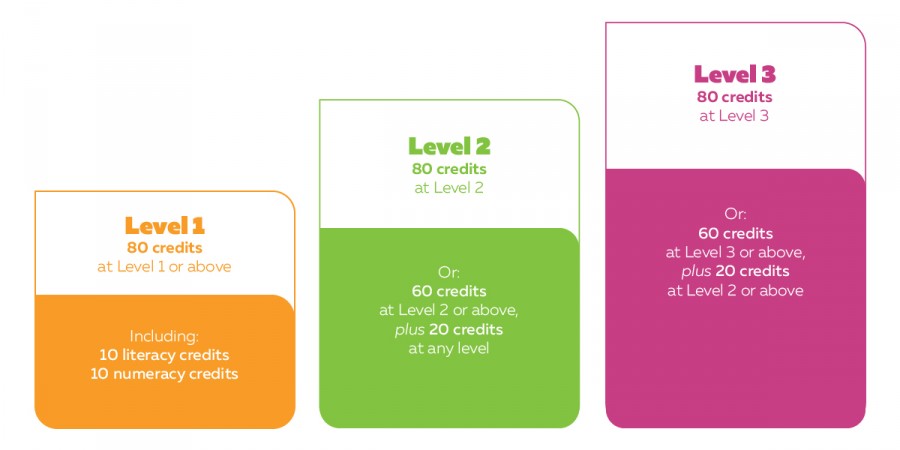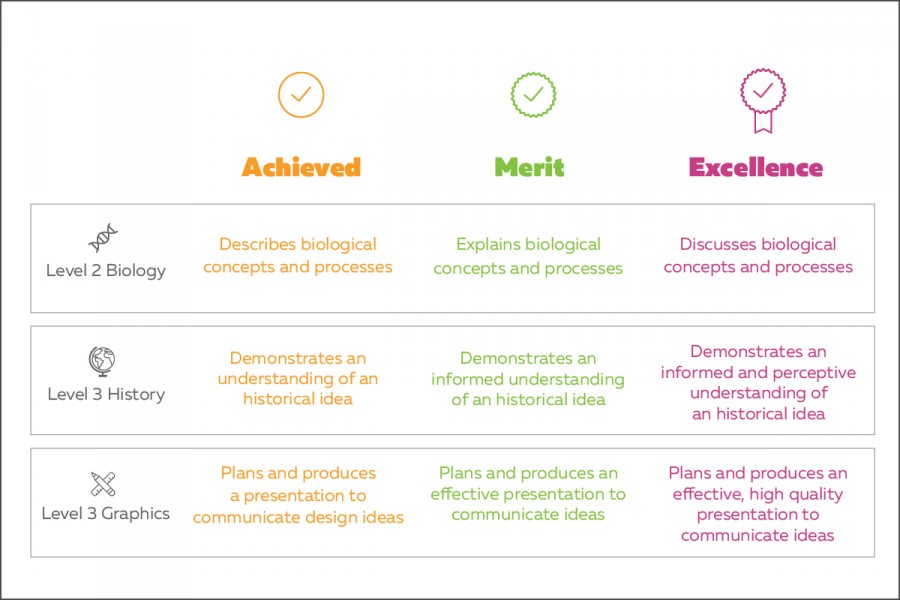What is NCEA?

Learn about NCEA and credits.
What's on this page?
How NCEA works
NCEA (National Certificate of Educational Achievement) is the main secondary school qualification in New Zealand.
Usually you study for:
- NCEA Level 1 in Year 11
- NCEA Level 2 in Year 12
- NCEA Level 3 in Year 13.
NCEA is recognised by employers and tertiary education providers in New Zealand and overseas.
NCEA is part of the New Zealand Qualifications and Credentials Framework (NZQCF) which ranges from Level 1 to Level 10, and includes certificates, diplomas and degrees.
What does NCEA involve?
NCEA involves choosing subjects, doing assignments such as essays, experiments or tests during the year, and sitting exams or submitting a portfolio at the end of the year.
Talk to your school to find out what NCEA subjects it offers.
How is NCEA work assessed?
NCEA work is assessed externally or internally.
- When your work is externally assessed, you usually sit a national exam at the end of the year, which is set and marked by the New Zealand Qualifications Authority (NZQA).
- When your work is internally assessed, you usually do essays, experiments or tests throughout the year, which are marked by your school.
- Internal assessment marking is also checked by independent moderators from NZQA to make sure all schools are assessing work to a national standard.
Assessment can be in either English or te reo Māori.
Every NCEA subject is made up of standards that are worth a certain number of credits.
What are achievement standards and unit standards?
Standards are particular skills or knowledge within a subject. There are two types of standards in NCEA: achievement standards and unit standards.
Subjects such as English and science can help you gain achievement standards.
- Achievement standards are graded using the 'NAME' system:
- 'N' for not achieved
- 'A' for achieved
- 'M' for achieved with merit
- 'E' for achieved with excellence.
Vocational subjects, such as hairdressing or carpentry, as well as usual subjects, can help you gain unit standards.
- Unit standards are graded:
- 'A' for 'achieved'
- 'N' for 'not achieved'.
What are credits?
Each standard is worth a certain number of credits. When you achieve a standard, you earn the amount of credits that standard is worth.
- A single achievement standard is usually worth three or four credits.
- A single school subject is usually made up of five to eight standards.
- Depending on your school, the usual number of credits needed to pass a subject is 18 to 25.
- Literacy and numeracy credits are available through a range of subjects.
- Literacy credits show that a learner can demonstrate reading, writing, speaking and listening skills.
- Numeracy credits show that a learner can demonstrate number, measurement and statistical skills.
How many credits do you need for NCEA?
At each level you need to gain 80 credits altogether.
To gain NCEA Level 1 you need:
- 80 credits at any level (Level 1, 2 or 3).
- This must include a minimum of 10 literacy credits and 10 numeracy credits.
To gain NCEA Level 2 you need:
- a minimum of 60 credits at Level 2 or above; and
- 20 credits at any level.
- The Level 1 literacy and numeracy requirements must also have been met.
To gain NCEA Level 3 you need:
- a minimum of 60 credits at Level 3 or above; and
- 20 credits at Level 2 or above.
- The Level 1 literacy and numeracy requirements must also have been met.
What are merit and excellence grades?
Merit and excellence grades recognise learners who have achieved outstanding results.
You can gain a merit or excellence endorsement for individual achievement standards, for individual subjects or for an NCEA level certificate.
How do you get a merit or excellence grade for an achievement standard?
The criteria for merit or excellence grades vary depending on the subject. However, as a general guide:
- 'achieved' means that you demonstrated elementary level skills or knowledge
- 'achieved with merit' means that you demonstrated intermediate level skills or knowledge
- 'achieved with excellence' means that you demonstrated highly developed skills or knowledge.
Here are examples of criteria for achievement standards in biology, history and graphics at various NCEA levels.
To gain NCEA Level 3 with University Entrance you need:
- at least 14 credits in three approved subjects with:
- 10 numeracy credits at Level 1 or above
- 10 literacy credits at Level 2 or above, with five credits for writing and five credits for reading.
University Entrance is the minimum standard learners need to enrol at a university in New Zealand. However, you also need to meet the entry requirements of the programmes you want to study.
Check with potential universities about their entry requirements.
How do you get a merit or excellence grade for a subject?
If you want to get a merit or excellence grade for an individual subject, you need to achieve 14 or more merit or excellence credits in that subject in a single year.
For example, if you're aiming to get NCEA Level 2 English with excellence you have to get enough English achievement standards at excellence level to add up to 14 credits or more.
At least three of these credits need to be from externally assessed achievement standards, plus at least three credits from internally assessed achievement standards.
How do you get a merit or excellence grade for an NCEA certificate?
If you want to get a merit or excellence grade for an NCEA certificate, you need 50 credits or more at merit or excellence in one NCEA level.
For example, if you're aiming to get an NCEA Level 2 certificate with excellence, you need enough Level 2 achievement standards at excellence level to add up to 50 credits or more.
NCEA resources from NZQA
Resources and videos
Find out about NCEA and online exams in NZQA's guide to NCEA, video, flyers and fact sheets.
Workshops for whānau Māori and Pacific families
NCEA me te Whānau workshops are for whānau Māori to find out more about NCEA.
NCEA ma le Pasifika workshops are for Pasifika families to find out more about NCEA.
Talk to a career adviser
If you need more information about NCEA talk to your school’s career adviser or your dean, or contact careers.govt.nz.
Find out more
Updated 10 Jul 2024

